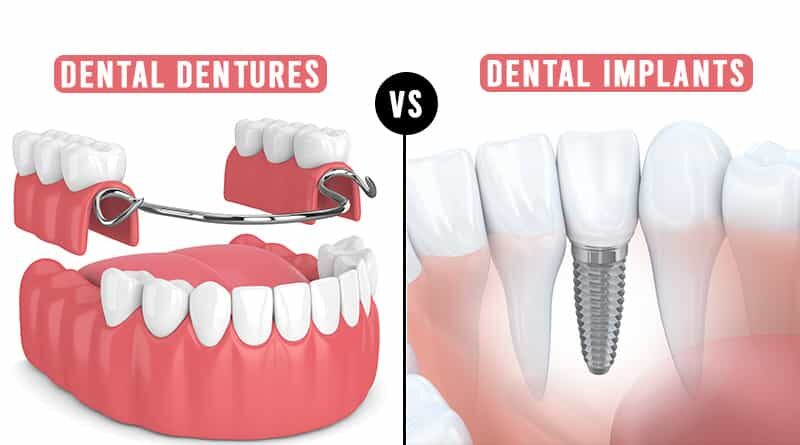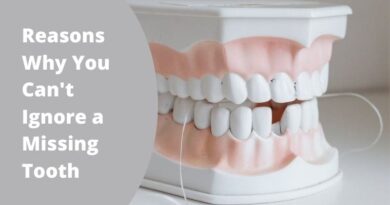Dental Dentures vs Implants: Which Should You Chews?
Having gaps in your smile can severely knock your confidence. Failing to replace tooth loss can also have several oral health consequences as exposed gums are vulnerable to infections and gum disease. Missing teeth can also shift the structure of your jaw, potentially causing more tooth loss and creating problems with eating and talking.
Losing teeth is more common than you think. A recent survey found that almost three-quarters of Brits don’t have a full set of natural teeth and 6% have none left at all(1).
Dentures and implants are common tooth replacement treatments with varying benefits. But which option is best for you?
Dental Dentures vs Implants
Dentures
Dentures(2) are false teeth made from acrylic, nylon, or metal. A plate is moulded to the shape of your mouth and clips onto your natural teeth with a metal clasp. The false tooth or fake tooth is then attached to it. A complete denture replaces a full set of teeth whereas a partial denture replaces just a few missing teeth.
What are the benefits?
If you’ve been living with gapped teeth because you don’t have the budget for a permanent replacement, dentures are ideal as they’re available on the NHS as a band three treatment. Affordable treatment is even more beneficial if several or all of your teeth need replacing.
Dentures also don’t take too long to produce so you can fix your smile within weeks.
Due to the modern advancements of dentistry, dentures are now very natural looking. The dentist practice, Churchfield Dental, provides a bespoke denture service with a wide range of natural, gender-specific tooth shapes and shades. This ensures the false teeth will seamlessly match your regular teeth and hugely boost your confidence.
Read: Oral Health Problems
What are the disadvantages?
Dentures aren’t a permanent fix to tooth loss as they are completely removable, and usually need removing at night to allow your gums to rest.
You’re required to clean the denture regularly to avoid tooth decay, gum disease, bad breath, and oral thrush. At least once a day, brush the denture with denture cleaner and soak it in a denture-cleaning solution. When you take the denture out overnight, keep it in a glass of water to stop it from drying out.
If your jawbone or gums shrink, your denture may become loose. An ill-fitting denture can be uncomfortable and cause unwanted movement when talking and eating, therefore an implant support denture adds extra security as it’s held in place by an implant. These types of dentures do still need to be taken out at night.
Dentures also aren’t as durable as implants. With proper care, they can last up to ten years, but they can break easily if you bite into something tough or drop them.
Read: Home Remedies for Cavities
Implants
Dental implants(3) are titanium screws which are fitted directly into your jawbone where the root of the missing tooth should be. A fake tooth is then attached to the implants in a second procedure.
What are the benefits?
When looked after efficiently, implants can last a lifetime, so you don’t need to worry about regular replacements. The maintenance is very similar to cleaning your regular teeth. You brush them and floss in between them and don’t need to remove them.
Dental implants also improve your oral health as they can stimulate bone growth and prevent bone loss. It’s also not necessary to alter the surrounding teeth to accommodate the implant.
Implants can also hugely boost your confidence because of their natural appearance and permanent fixture. You won’t need to worry about it coming loose or affecting your speech or eating.
Read: Teeth Whitening Methods
What are the disadvantages?
Getting dental implants is a lengthy process which can take several months.
It includes:
- A thorough evaluation
- At least one surgical procedure
- Time to allow the gums to heal
- Getting impressions made of your mouth
- Bone grafting if required
This treatment is also quite costly. According to previous reports, the national average fee of a single tooth implant at private dentists is £2,415. The NHS rarely covers this treatment. However, this price is a worthy investment due to the long-lasting benefits. You may also be able to get a monthly payment plan.
Although dental implants are generally suitable for most adults with good health, there are some exceptions, such as if you smoke or have gum disease.
Both treatments will protect your oral health, transform your smile, and restore your confidence. However, if you need further advice on which option your most suited to, you should seek advice from a dental professional.




